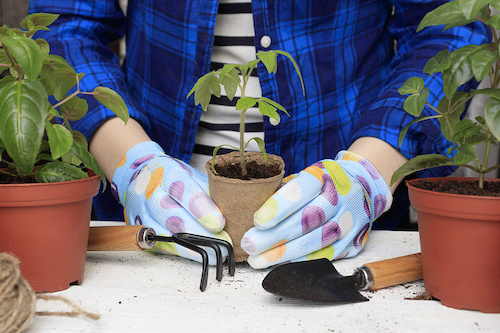 If you’re at your happiest when gardening, you’re not alone.
If you’re at your happiest when gardening, you’re not alone.
Researchers from the University of Florida have found that working with plants could have a mental health benefit, even among those who have never tried gardening before.
“The results of our small study show that engaging in gardening activities appears to lower indications of mood disturbance, depression, perceived stress and anxiety over the course of the treatment in healthy women based on scores of well-established self-report questionnaires,” Charles Guy, PhD, principal investigator of the study and a professor emeritus in the UF/IFAS environmental horticulture department told Theravive.
“There is a long history of anecdotal realization that engaging in gardening activities and horticultural therapy, or people-plant interactions has therapeutic benefits. What is fundamentally different than most other anecdotal accounts of something having therapeutic properties is the fact that perhaps millions of gardeners have expressed such a sentiment over long periods of time. Our study uniquely shows that gardening activities can provide therapeutic benefits for healthy women.”
In undertaking the study, the researchers enlisted 32 women aged between 26 and 49 as study participants. The women were screened for factors like tobacco use, drug abuse, prescribed medications, depression and anxiety.
The women were in good health.
Half of the participants did gardening sessions and the other half did art making sessions. Both groups went to their activities twice every week over a period of eight weeks.
Art was chosen as a comparison activity to gardening as both activities involve planning, learning, physical movement, creativity and both are used in medical settings therapeutically.
During their sessions about gardening, the women were taught how to sow and compare different seeds, transplant different varieties of plants and harvest as well as taste plants that are edible.
Meanwhile in the art classes, the women learned collage, drawing, paper making and printmaking.
The participants in both groups were asked to complete some assessments that measured their stress, mood, anxiety and depression.
Both gardening and art were found to improve the mental health of participants. Those in the gardening group also reported they experienced less anxiety than those in the art group.
The researchers note that the study is small, and the modest differences in outcomes between the gardening and art groups could suggest with a larger sample size gardening may perform better than art as a form of therapy for healthy women.
The concept of using gardening for the improvement of health and wellbeing is not new. This has occurred since the 19th century and is known as therapeutic horticulture.
Whilst it has long been used to improve the lives of those with existing medical conditions, this study suggests gardening may also be used to improve the mental health of healthy people.
“Engaging in gardening or art-making activities over a short period of time provided measurable therapeutic benefits to the mental health well-being of perfectly healthy women,” Guy said.
The study did not determine why plants and gardening could improve wellbeing. One reason could be that as a species, humans are attracted to working with plants as they have depended on them for survival, food and shelter.
Guy argues the findings of the study suggest gardening could be something healthcare providers could consider for patients.
“I believe there is sufficient evidence to justify therapeutic horticulture in social prescribing. Through the therapeutic horticulture program at Wilmot Botanical Gardens here at the university, we have witnessed firsthand participants exhibiting benefits that positively impacted their quality of life and well-being,” he said.
“That being said, to move gardening and therapeutic horticulture to a more prominent role in healthcare and public health, the gold standard of randomized controlled clinical trials is needed for a range of clinical populations.”
Elizabeth Pratt is a medical journalist and producer. Her work has appeared on Healthline, The Huffington Post, Fox News, The Australian Broadcasting Corporation, The Sydney Morning Herald, News.com.au, Escape, The Cusp and Skyscanner. You can read more of her articles here. Or learn more about Elizabeth and contact her via her LinkedIn and Twitter profiles.